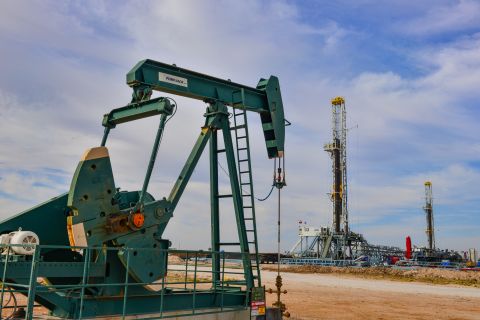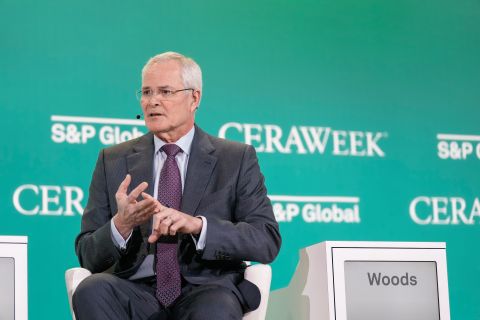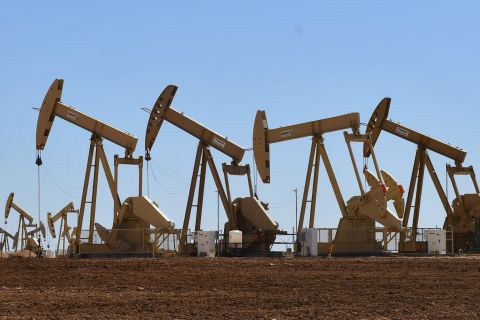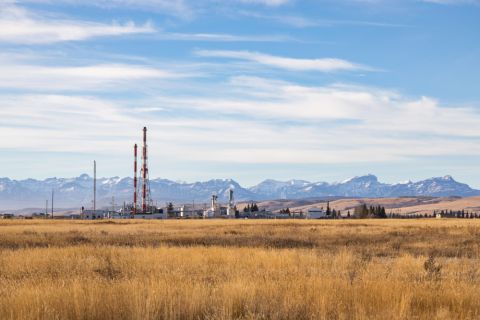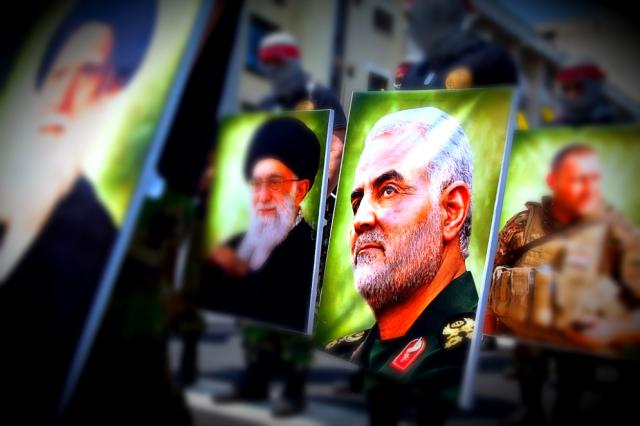
Quds Day 2019 parade in Tehran along with photograph of Qassem Soleimani. (Source: saeediex/Shutterstock.com)
Context of the rising tension
These last few months, Stratas Advisors has been closely following the situation in the Middle-East and in particular the growing tensions between Washington and Tehran. What was originally a war by proxy has dangerously become a direct confrontation on Dec. 30, as the American administration gave the order to carry out strikes against installations of the Hezbollah Brigades, one of the pro-Iran factions of Hachd al-Chaabi, coalition of paramilitaries formed to fight against the jihadists and now integrated into the forces of Iraqi security. Twenty-five members of the pro-Iran militia were killed in this strike.
According to the Pentagon, the raids were aimed at “weakening the capabilities of Hezbollah’s brigades to carry out future attacks.” Since Oct. 28, 11 rocket attacks have targeted bases where American soldiers or diplomats are posted, even reaching the American embassy in Baghdad's Green Zone. The latest attack killed a U.S. contractor and for the first time, 36 rockets landed on a single base housing American soldiers.
In response to a subsequent American air strike that killed 25 people, thousands of people including Hachd Al-Chaabi’s militiamen stormed the American Embassy in Baghdad in the very secure green zone.
Finally, on Jan. 3 in the middle of the night, an American drone bombed two cars coming out of Baghdad’s airport. Qassem Soleimani, the architect of Iran’s Middle East strategy, and Abu Mahdi al-Muhandis, were both killed instantly.
RELATED:
Oil Tops $70 As Middle East Tensions Rattle Markets
Tehran has promised “harsh revenge” for the death of its most popular general whom everyone in the Middle East thought was absolutely untouchable. That revenge will be carried out “in the right place and at the right time,” added Iran, heightening fears in Iraq that the country would be used as a battlefield for its two allies, Tehran and Washington.
Just before the funeral began on Jan. 4, Washington struck again with another strike against Hachd al-Chaabi north of Baghdad.
From proxy war to direct confrontation
Soleimani’s special status means that Tehran does not consider that it has lost a soldier or even a high-ranking officer, but a very high-ranking dignitary of the regime. Soleimani had more influence on Iran’s diplomacy in the region than Iran President Hassan Rouhani himself. In many ways, this general was considered second in command of the regime. This is why his target assassination is believed to be the assassination of a key member of the government and Tehran’s response will no doubt be harsh.
The assassination of an Iranian official by the U.S. military now sets a precedent that the Iranians will hasten to follow.
This rise in tension appears in a moment when Tehran faces a hard economic crisis—triggered by U.S. sanctions—as well as serious challenges to its influence in Lebanon and in Iraq. In other words, the regime is in a situation where it has nothing to lose as it already has its back against the wall. In this context, it appears that only a hard response can rebalance the political legitimacy within its borders and reaffirm its influence and power outside of the border. U.S. President Donald Trump seems to be in the exact same situation. The destruction of an American drone by Iran without an American reply can let Tehran believe that the U.S. does not want a confrontation, which is why Iran targeted the Saudi oil infrastructure. Trump wants to rebalance the power and can’t afford a perception in which the Iranian regime would have the last word, for diplomatic reasons as well as political reasons, since Trump is currently in pre-election period.
In addition to this political context, it is important to tie these tensions to the hard economic sanctions against Iran. Hence, the biggest risk of a direct confrontation is that in this particular case there is no mechanism that prevents the escalation to broader regional unrest.
The U.S. and Iran don’t have official direct communication channels, and instead, have to rely on Swiss intermediaries. This means that the slightest incident can be misunderstood and lead to a bigger confrontation. Moreover, it’s probable that the point of confrontation will continue to be in Iraq which is itself going through a political crisis and as such cannot facilitate a de-escalation in case of direct confrontation.
Iraq sees the assassination of Soleimani as a murder of a foreign official which is an unacceptable violation of its sovereignty.
This air raid against Soleimani thus creates a rare consensus in Iraq, a country torn apart since over three months by a popular revolt denouncing corruption and foreign influences.
As the U.S. “violated the sovereignty of Iraq,” in the words of the highest state leaders, Hachd commanders called on their fighters to “stand by.”
The influential Iraqi Shiite leader Muqtada al-Sadr even reactivated the Mahdi Army, its disbanded militia.
It is now necessary, urged Hadi al-Amiri, the leader of the pro-Iran faction in the Iraqi Parliament, “to close ranks to drive the foreign troops” out of Iraq.
On Jan. 5, the Iraqi parliament asked the government to end the Iraqi-American agreement that frames the presence of 5,200 American soldiers on its soil. In the meantime, Washington announced the deployment of 3,000 to 3,500 additional soldiers in Kuwait, in addition to 750 others already sent this week. Following this step, Iranian public television reported the deployment of Iranian F-14s along the Iraqi border.
What are the risk for barrel prices?
The assassination of powerful Iranian general Soleimani caused a surge in oil prices Jan. 3 while oil was already experiencing a serious recovery since mid-December. Barrel prices rose up to 4% soon after the announcement of the death of Soleimani before finishing up 3.5% for Brent and 3.1% for West Texas Intermediate (WTI). There seems to be consensus that there will be an Iranian response, but nobody can say where, when and how.
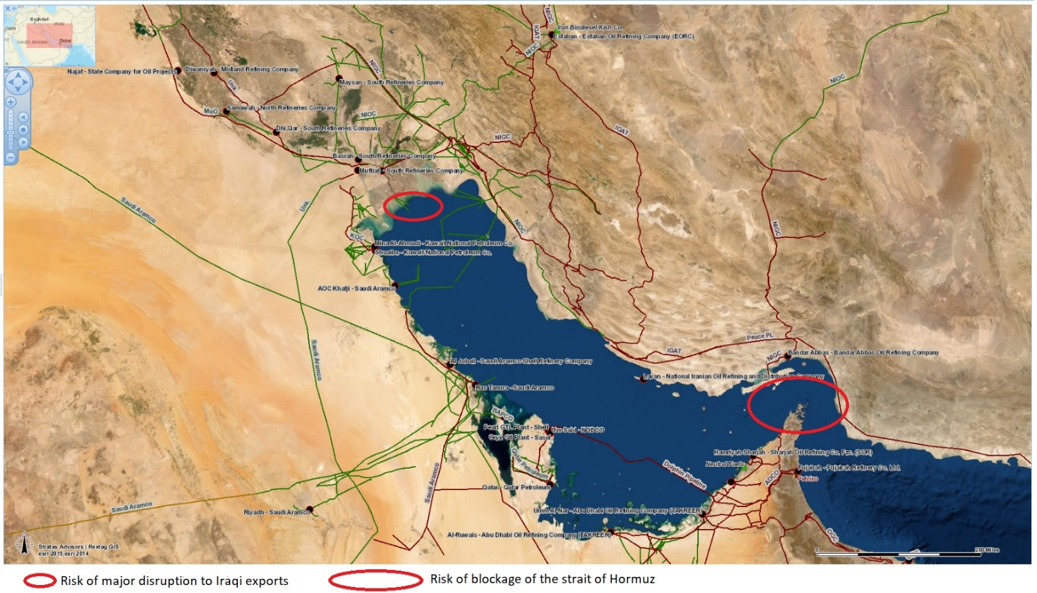
However, Iraq will certainly be the location of Iranian response. Indeed, Iranian presence is very strong in Iraq, with a very sound knowledge of the terrain, a coordinated attack from Hachd al-Chaabi with revolutionary guard can be severe for American soldiers. A confrontation within Iraq—a weak state without government, going through a political crisis where many militias are present—can easily turn all of Iraq’s territory into a battlefield. In that case, the Iraqi export can be seriously disrupted or even completely stopped because of its strong dependence on the oil terminal of Basrah and Khawr al Amaya in the southeast of the country. Together with the blockade of Strait of Hormuz, this is the most significant risk for the barrel prices after the death of Soleimani.
Based in the Brussels office of Stratas Advisors, Anas Abdoun is the firm’s Africa and Middle East analyst in the global fuel specifications and short-term outlook departments.
Recommended Reading
Mighty Midland Still Beckons Dealmakers
2024-04-05 - The Midland Basin is the center of U.S. oil drilling activity. But only those with the biggest balance sheets can afford to buy in the basin's core, following a historic consolidation trend.
CEO Darren Woods: What’s Driving Permian M&A for Exxon, Other E&Ps
2024-03-18 - Since acquiring XTO for $36 billion in 2010, Exxon Mobil has gotten better at drilling unconventional shale plays. But it needed Pioneer’s high-quality acreage to keep running in the Permian Basin, CEO Darren Woods said at CERAWeek by S&P Global.
Mesa III Reloads in Haynesville with Mineral, Royalty Acquisition
2024-04-03 - After Mesa II sold its Haynesville Shale portfolio to Franco-Nevada for $125 million late last year, Mesa Royalties III is jumping back into Louisiana and East Texas, as well as the Permian Basin.
Life on the Edge: Surge of Activity Ignites the Northern Midland Basin
2024-04-03 - Once a company with low outside expectations, Surge Energy is now a premier private producer in one of the world’s top shale plays.
Analyst: Chevron Duvernay Shale Assets May Sell in $900MM Range
2024-01-29 - E&Ps are turning north toward Canadian shale plays as Lower 48 M&A opportunities shrink, and Chevron aims to monetize its footprint in Alberta’s Duvernay play.

